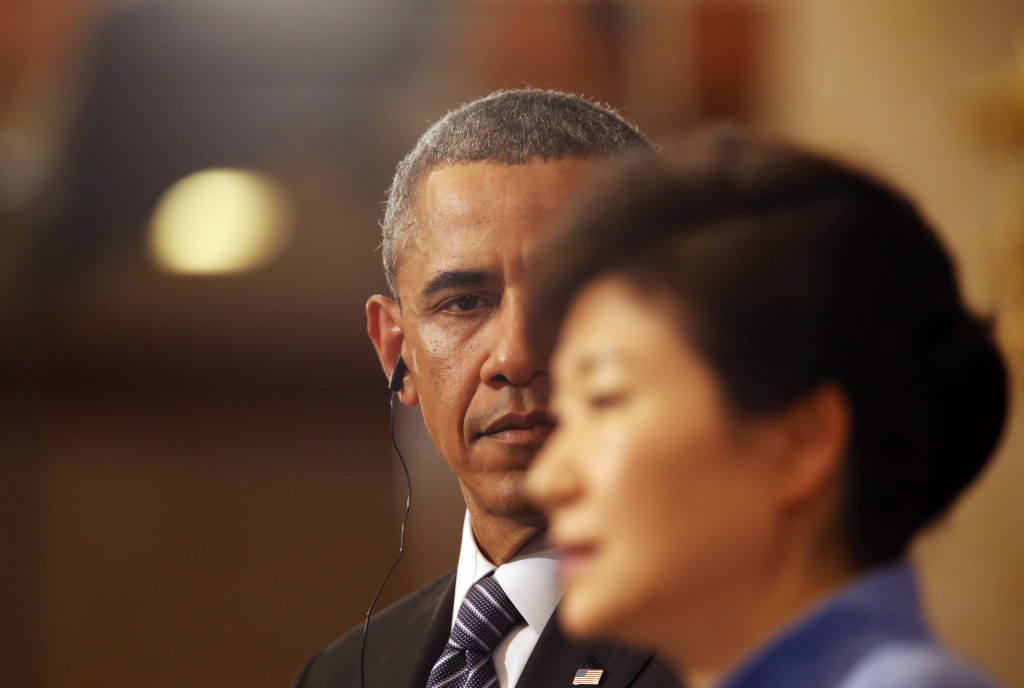- California Assembly OKs highest minimum wage in nation
- S. Korea unveils first graphic cigarette warnings
- US joins with South Korea, Japan in bid to deter North Korea
- LPGA golfer Chun In-gee finally back in action
- S. Korea won’t be top seed in final World Cup qualification round
- US men’s soccer misses 2nd straight Olympics
- US back on track in qualifying with 4-0 win over Guatemala
- High-intensity workout injuries spawn cottage industry
- CDC expands range of Zika mosquitoes into parts of Northeast
- Who knew? ‘The Walking Dead’ is helping families connect
Is Obama pressing S. Korea to fight IS?

Some experts believe U.S. President Barack Obama is looking at South Korea and Japan’s direction. (Korea Times file)
By Jun Ji-hye
Is the United States calling for a more active role by South Korea in its fight against Islamic State (IS) in Iraq and Syria?
Some experts believe so, citing U.S. President Obama’s recent statement.
Regarding the Asia-Pacific region, Obama was quoted as saying during a visit to the Department of Defense, Wednesday, “The anchor of our presence there are treaties and alliances with key countries like South Korea and Japan.”
This remark could sound like business as usual but, considering it came after he received a briefing about the U.S. action against the Middle East extremists, it took on an added significance.
“The U.S. has relationships in Southeast Asia, but far more soldiers and equipment are here in Korea and Japan. This makes the two countries more important than other regional allies,” said Robert Kelly, a professor of political science at Pusan National University
But there could be the hidden meaning that Obama was apparently pressing Seoul and Tokyo to do something to support the Washington-led anti-IS campaign, he said.
“The U.S. should not really be acting alone. If it does, it risks a repeat of Iraq. And the U.S. would like its allies who benefit from its defense resources to contribute,” said Kelly.
Kim Youl-soo, a professor of international political science at Sungshin Women’s University, agreed.
“The remark is construed as Obama’s indirect expression calling on Seoul and Tokyo, which have maintained strong alliance with Washington, to join the country’s campaign,” he said.
“I expect Japan to dispatch its troops for the U.S. However, South Korea should not be affected by this. It needs to take a cautious attitude before making a decision on whether it will offer support beyond humanitarian assistance,” he said.
Seoul is seeking to provide humanitarian assistance — consisting of financial aid, logistics, food and medicine — to support the fight against the Islamic militants.
Kim Kwan-jin, chief of the National Security Office at Cheong Wa Dae, said in September that the government was willing to help the U.S. campaign within reasonable limits.
“It would be mostly humanitarian assistance worth about 1.2 million dollars. The money can increase though,” he said during a three-day trip to Washington to meet his U.S. counterpart, Susan Rice.
The government appears to only want to make humanitarian contributions, considering its relationship with Middle Eastern countries and the possible consequences of helping in the U.S.-led military action.
There are some reports that the National Intelligence Service (NIS) hasn’t ruled out the possibility of Koreans overseas being targeted by Islamic terrorists, and has alerted the foreign, justice and defense ministries, among others and recommending closer checks at ports of entry.
However, the NIS is said not to have detected any signs of imminent acts of terrorism.
An Al Qaida-linked Islamic group beheaded a Korean in 2004 to protest Korea’s decision to dispatch troops to Iraq.















